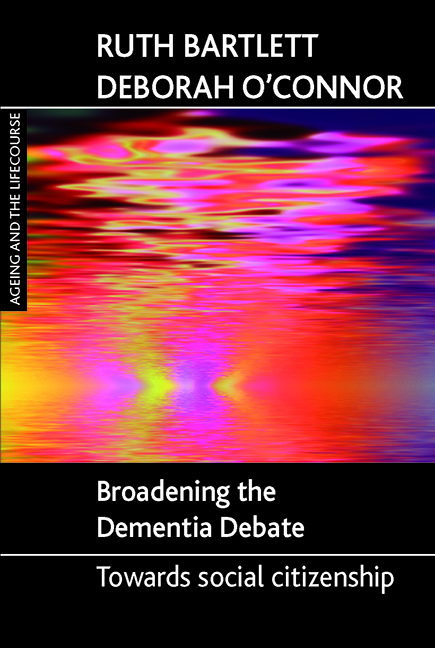three - The meaning and value of social citizenship
Published online by Cambridge University Press: 01 September 2022
Summary
Introduction
In the previous chapter the argument was made for a more contextualised, sociopolitical understanding of dementia. In taking this approach, citizenship emerges as an essential concept. The concept of citizenship is proving increasingly popular among people with early dementia, service providers, professional care workers, voluntary organisations and academics alike, and is often used alongside personhood to promote the rights of people with dementia. However, it is generally used uncritically and with little explanation or clarification as to what it actually means in relation to people with dementia, especially individuals with very severe dementia. The aim of this chapter is to analyse the concept of citizenship, explore some of its strengths and boundaries and in so doing posit a way of understanding and defining social citizenship that has relevance for dementia studies.
The chapter begins by outlining a traditional view of citizenship before discussing contemporary definitions and analysis of this concept. The discussion focuses on contemporary definitions most relevant to people with dementia, including: citizenship as practice; active and passive modes of citizenship; the importance of recognising difference, contradiction and fragmentation; and semicitizenship. Some of the boundaries of citizenship are outlined. In addition, the idea is compared and contrasted with personhood in order to show the elements that citizenship brings to the field. Having examined a range of debates about citizenship, and discussed it in relation to personhood, the chapter sets out the components of a social citizenship approach for dementia studies and concludes by arguing for further debate about the exact nature of citizenship in the context of people with dementia.
Traditional views of citizenship
The original idea of citizenship can be traced back to Aristotle, the Roman Empire and developments of the state. At that time the term was used to distinguish between those who were ‘good citizens’ and those who were not. Essentially, a ‘good citizen’ was considered to be someone who was politically active, full of civic spirit and educated, whereas a ‘bad citizen’ was someone who showed no interest in civic life or the workings of the state (Heater, 1999).
Modern views of citizenship can be dated back to the French Revolution in the mid-18th century when the idea was linked with equality and inalienable rights (Turner, 1986).
- Type
- Chapter
- Information
- Broadening the Dementia DebateTowards Social Citizenship, pp. 29 - 48Publisher: Bristol University PressPrint publication year: 2010

